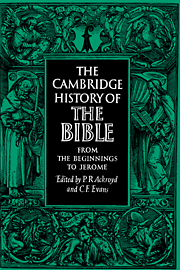Book contents
- Frontmatter
- I LANGUAGE AND SCRIPT
- II BOOKS IN THE ANCIENT WORLD
- III THE OLD TESTAMENT
- 5 THE OLD TESTAMENT IN THE MAKING
- 6 CANONICAL AND NON-CANONICAL
- 7 THE OLD TESTAMENT TEXT
- 8 BIBLE AND MIDRASH: EARLY OLD TESTAMENT EXEGESIS
- IV THE NEW TESTAMENT
- V THE BIBLE IN THE EARLY CHURCH
- Bibliography
- Abbreviations
- Notes on the Plates
- Indexes
- Plate Section">
- References
5 - THE OLD TESTAMENT IN THE MAKING
from III - THE OLD TESTAMENT
Published online by Cambridge University Press: 28 March 2008
- Frontmatter
- I LANGUAGE AND SCRIPT
- II BOOKS IN THE ANCIENT WORLD
- III THE OLD TESTAMENT
- 5 THE OLD TESTAMENT IN THE MAKING
- 6 CANONICAL AND NON-CANONICAL
- 7 THE OLD TESTAMENT TEXT
- 8 BIBLE AND MIDRASH: EARLY OLD TESTAMENT EXEGESIS
- IV THE NEW TESTAMENT
- V THE BIBLE IN THE EARLY CHURCH
- Bibliography
- Abbreviations
- Notes on the Plates
- Indexes
- Plate Section">
- References
Summary
THE PROBLEM OF ORIGINS
At one end of the process are the necessarily nebulous beginnings of Israel's literature. Since our concern is to understand something of the whole range of ways by which the material now in the Old Testament came into being, some definition must be made of the starting point in time. And this definition is as difficult to make as is the decision where to begin a history of Israel or a study of Israel's religion. It may be convenient for the former to determine the point in time at which it is proper to speak of Israel as an entity rather than as a loose agglomeration of small elements, and to decide on this basis that the history of Israel in the true sense begins with the monarchy, or with the tribal amphictyony, or with the Exodus; the decision will be made by each historian on his own terms. But inevitably he must also assess the available evidence for the pre-history of those elements which were ultimately to become explicitly Israel. Similarly the study of Israel's religion involves a decision on starting point, but again, whatever the choice, the pre-settlement religion or the pre-Mosaic religion comes under discussion however uncertain of interpretation the evidence may be. Israel's literature, naturally enough, is so tied in with both history and religion that a comparable decision about origins has to be made. But the lines have to be drawn from there back into the remoter past, just as—again as with religious and institutional problems—the origins of literary types which appear at a later stage have also to be investigated.
- Type
- Chapter
- Information
- The Cambridge History of the Bible , pp. 67 - 113Publisher: Cambridge University PressPrint publication year: 1970
References
- 2
- Cited by

